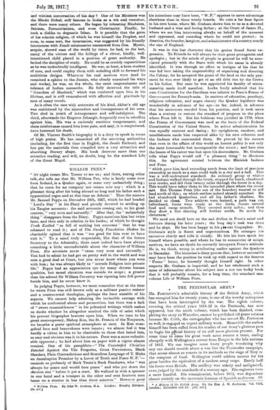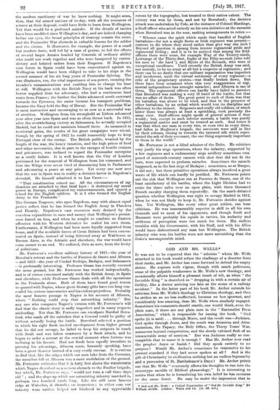THE PE/HNSULAR ARMY.*
Mn. FORTE8Cre8 admirable history Of the Beath Army, uhielt has occupied him for twenty years, is one of the worthy enterpriees that have been interrupted by the war. The eighth volume, covering the critical years 1811.12 in the Peninsula, ham now. appeared, but the ninth volume, which has been finished, com- pleting the story tq Waterloo, cannot be published till Peace returns because Mr. Cribb, the cartographer who has eased Mr. Forteacuo as well, is engaged on urgent military work. Meanwhile the author himself has been called from his studies of our Army's glorious past to begin hie official history of ita atilt more glorious present. For some tinto to come his great work must remain a torso, ending abruptly with Wellington's retreat from Burgos in the late autumn of 1812. We can imagine some hasty people wondering why any one should trouble about a war like the Peninsular campaign, that seems almost se remote in its methods as the siege of Troy or the conquest of Gaul. Wellington could seldom muster for his great battles the equivalent of a modern army corps. Barely half his forces were British. His artillery was scanty and antiquated, even judged by the standards of a century ago. His engineers were a mere handful. His commissariat, before 1812, was dependent almost entirely on the uncertain humour of Spanish muleteers. Of • 4 History of its Britt.* Army. By the Has 3. W. eorteseue. Vol. VIM. ;thadro: Sisemeiss end CO. C.40a. att.( the modem machinery of war he !mew nothing. It might seem, then, that the armed nations of to-day, with all the resources of science at their disposal, could have little to learn from Wellington. Yet that would he a profound mistake. If the details of tactics have been modified since Wellington's day, and are indeed changing before our eyee, the broad principles of strategy remain the same. and the Peninsular War abounds in valuable lessons for the soldier and the citizen. It illustrates, for example, the power of a small but resolute force, well led by a man of genius, to foil the efforts of several larger Armies headed by Generals of ordinary ability who could not work together and who were hampered by contra- dictory and belated orders from their Emperor. If Napoleon's vast forces in Spain Could have been concentrated against us. Wellington would have been obliged to take to his ships in the second summer of his six long years of Peninsular fighting. The war illustrates, too, the vital importance of sea-power, ensuring the invader's communications and enabling him to change his base at will. Wellington with the British Navy at his back was often better supplied than his adversary, who had a continuous land route from Franco; the further the Duke advanced north-eastward towards the Pyrenees, the easier became his transport problems, because the Navy held the Bay of Biscay. But the Peninsular War is most instructive and encouraging to us now as a successful war of attrition. Wellington from his stronghold at Lisbon advanced year after year into Spain and was as often thrust back. In 1812, after the overwhelming victory at Salamanca, he actually occupied Madrid, but he could not maintain himself there. As measured in territorial gains, the results of his great campaigns were trivial, though by the spring of 1812 ho could reasonably hope to keep Portugal clear of the enemy. The British publics wearied by the length of the war, the heavy taxation, and the high prices of food and other necessaries, due in part to tho ravages of hostile cruisers and privateers, was inclined to regard the Peninsular enterprise as is costly failure. It is well known that the City of London petitioned for the removal of Wellington from his command, and that the Whigs were never tired of denouncing him in Parliament and advocating a peace at any price. Yet every me now sees that the war in Spain was in reality a decisive factor in Napoleon's downfall. He himself admitted it to Las Cases :—
" That combination rained me. All the circumstances of my disasters are attached to that fatal knot : it destroyed my moral power in Europe, complicated my embarrassments, and opened a echool for the English soldiers. It is I who formed the English Army in the Penilistda."
Tito German Emperor, who apes Napoleon, may with almost equal justice reflect that he has formed the English Army in Flanders and Picardy. Napoleon's vast resources were drained by the ceaseless expenditure in men and money that Wellington's persist. ence forced on him, and when he sought to combine an Eastern offensive with his Western defensive he sealed his own doom. Furthermore, if Wellington had been more loyally supported from home, and if the available forces of Great Britain had been concen- trated on Spain, instead of being frittered away at Waleheren or Buenos Aires, in the Adriatic and elsewhere, the war would have tame sooner to an end. We suffered, then as now, from the levity of politicians.
Mr. Forteseue's excellent military history of 181I—the year of SluesSnes retreat and the battles of Fuentes de Onoro and Albuera -sand 1812—the year of Ciudad Rodrigo, Badajoz, and Salamanca --is profoundly interesting. Professor Oman has recently covered the same ground, but Mr. Forteseue has worked independently, and is of course concerned mainly with the British Army, in Spain and elsewhere, while Professor Oman deals with all the operations in the Peninsula alone. Both of them have found good reason to quarrel with Napier, whose groat literary gifts have too long con- cealed his eerieus inaccuracies and his violent prejudices_ Probably the most famous passage in Napier is his account of Albuera, where " Nothing could stop that astonishing infantry." But any one who comparee Napier's version with Mr. Fortescue's will find that the classic story is sadly imperfect and in many respects misleading. Not that Mr. Fortesmie can exculpate Marshal Berea.
ford, who made all the mistakes that a General could be guilty of without actually losing the battle. Beresford selected a position in which his right flank invited envelopment from higher ground that he did not occupy, he failed to keep his outposts in touch with Souk and was taken unawares by a flank attack, and he began to order a retreat at the entrant moment when fortune was in:-lining in his favour, Had not Soult been equally irresolute in pressing his advantage, Albsiera must, humanly speaking, have been a great disaster instead of a very costly SUCC069. It is curious
to find that, like the ridges which our men take from the Germans, the nameless hill at Albuera was a more undulation of the ground.
Mr. Forteseue oda:idea that it Is forty feet above the watercourse
which Napier deserffied as a til : ious obstacle to the Fusilier brigade, but whirl:, Mr. Fortescue soy,. "would not turn a calf three days
old " ; anti the slope up whirl: our astonishing infantry marched is, perhaps, two hundred yards long. Like the still snore famous ridge at Waterloo, it dwindles on inspeetimi ; in either ease our infantry were neither lir ired nor hindered to any appreciable extent by the topography, but trusted to their native valour. The victory was won by them, and not by Beresford ; the decisive attack was undertaken by Cole, at the instance of Colonel Hardinge, a Staff officer who acted entirely on his own initiative at the Moment when Beresford was in the rear, making arrangements to retire :—
" Whence came the spirit which made that handful of English battalions—for not a [single Seota or Irish regiment was present— content to die where they stood rather than give way one inch ? Beyond all question it sprang from intense regimental pride and regimental feeling ; and it is to be noticed that among the field. officers there were some, for example Way of the Twenty-ninth. Lestrange of the Thirty-first, Inglis of the Fifty-seventh [who told his men to 'die hard 'j, and Myers of the Seventh, who were of exceptional excellence. Until recently the British Army WWI said, not untruly, to be no army at all but a congeries of regimenta ; and there can be no doubt that our military organisation was imperfect and incoherent, until the virtual autonomy of every regiment—a relic of the proprietary system—was finally broken deem But there have been occasions when this very exaggeration of regi- mental independence has wrought miracles ; and Albuera is one of them. The regimental officers can hardly have failed to perceive that Beresford was making a very ill hand of the battle, but that was no affair of theirs. The great point to each of them was that his battalion was about to be tried, and that in the presence of other battalions, by an ordeal which would test its discipline and efficiency to the utmost. Sergeants and really old soldiers, of which latter there was always at least a sprinkling, took precisely the same view. Staff-officers might speak of general actions if they would ; but, except to such inferior mortals, a battle was purely a regimental matter and must be treated as such. And hence it was that when one man in every two, or even two in every three, had fallen in Hoghton's brigade, the survivors were still in line by their colours, closing in towards the tattered silk which repre- sented the ark of their covenant, the one thing supremely important to them in the world."
Mr. Forteacue is not a blind admirer of the Duke. He criticizes very justly his siege operations, where the infantry, supported by a few engineers and a rudimentary siege artillery sometimes cons posed of sixteenth-century cannon with shot that did not fit the bore, were expected to perform miracles. Sometimes the miracle happened, as in the last sieg,e of Badajoz ; sometimes, as at Burgos, it did not ; but these primitive operations always involved a great waste of life which can hardly be justified. Mr. Fortoseue points out the risk that Wellington ran at Fuentes do Onoro, one of the least satisfactory of his battles, where the Light Division had to retire for three miles over an open plain, with three thousand French cavalry charging them repeatedly. On the much-debated question whether Wellington was right to occupy Madrid in 1812, when he was not likely to keep it, Mr. Fortescue decides against him. Yet Wellington, like every other great soldier, can bear criticism. Ho was immeasurably superior in skill to all his own Generals and to most of his opponents, and though Soult and Marmont were probably his equals in tactica, his audacity and swiftness of perception were too much for them. His endless troubles with his Government, with his Staff, and with his Allies would have disheartened any man but Wellington. The British infantry who won hits battles were not moro astonishing than the Duke's unconquerable mind.



































 Previous page
Previous page